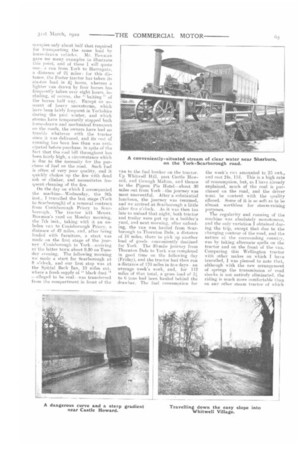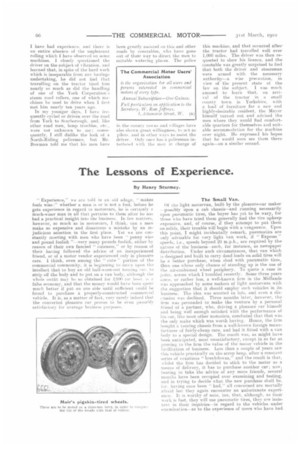One Day's Work (New Series)—No. 15.
Page 2

Page 3

Page 4

If you've noticed an error in this article please click here to report it so we can fix it.
A Yorkshire Removal Contractor Obtains Satisfactory Results from one of Foster's Wellington Tractors.
Recorded by a Member of the Editorial Staff.
Since my last " day's Ivork," with a Broom and Wade paraffin lorry, described in this journal in the 'sem of the 25th November last. numerous appointments have prevented my continuing the new series, ehich, for the greater part of last year, was a regular bi-weekly feature of Tire COMMERCIAL Moron. Time after time I have had to postpone engagements to accompany representative machines on their daily runs in different parts of the country. When, at last, I travelled northwards, to keep a longstanding engagement with Messrs. J. Bowman and Sons, removal c'ontrac'tors, of Monk Bar, York, and Mr. Fred Bowman showed to me the photo'graph of a snowbound road which is reproduced on this page, I felt really thankful that business in London, or in some other part of the country. had kept me away from the bleak Yorkshire roads and moors until the weather was more favourable. I do mot usually "jib " at uncomfortable jobs—as readers of this journal well know. I have, among other experiences, " stuck it " through a 24-hour continuous ploughing test, in spite of an almost-incessant fall of rain, sleet and snow—but the. prospects of becoming " snowed up " while crossing Bramham Moor, or some, equallydreary spot in Yorkshire's broad acres, is far from alluring. The photograph was taken near Leyburn in the Wensleydale; the snow at each side of the track was 6 ft. deep, and through this cutting Messrs. Bowman's "Wellington tractor, which was engaged on a large furniture-removal contract, at Hanby Hall, was driven for some distance,
and then, as the cutting became narrower, the tractor and its trailer were completely " snowed up " they remained there for four or fire days. When I heard 31r. Bowman's recital of the experience, and realized what I had escaped, I felt deeply grateful that Providence had found other employment for me during that period. Mr. Bowman told me that, before purchasing the tractor, his firm took careful stock of the available vehicles, and, to quote his own words, he " was not struck with any motor wagon as being suitable for the furniture-removal trade." He argued that such a wagon, when loaded with a large lift van full of furnitere, might scale anything up to 10 or 12 tons, and, as that weight. is carried on four wheels only, great damage might be caused to the carriage drives and drains in private parks, through which his firm's rolling-stock frequently has to travel.
" With a tractor," he continued, " the case is different, as one may have practically the same load distributed over eight wheels." Then, again, the packing of a load into a furniture van often takes a considerable amount of time, and, in such cases. a tractor, after taking one van to a house, may be driven off to another job—probably to take a loaded van into the depositoryreturning later for the first van, which, by that time, has been carefully loaded. After weighing up all the pros and cons of tractors versus wagons, and arriving at the conclusion that it. was amongst the former class that they must look for one to suit his firm's needs, Mr. Bowman visited the Yorkshire and other agricultural shows, but. finally, a description of the new spring-suspension-system of the Wellington tractor, which description appeared in our issue of the 24th June. 1909. led to his decision to acquire one of Foster's machines; Mr. Bowman informed me that they have had no reason to regret the selection.
Compared with the use of horses, this tractor regularly does the work of a team of four. and takes vans
weighing from to 6 tons up the ,teepest hills without any trouble: in fact, on many of the journeys which it has undertaken it would he necessary to employ no fewer than six horses in order to negotiate the steep oyadients. Then again, the time required for the transportation ff the load from one point to another occupies only about half that required for transporting the same load liv horse-drawn vehiclts. Mr. Bowman gave ine many examples to illustrate this point, and of these I will quote one —a run from York to Harrogate, a distance of 21 miles: for this distance, the Foster tractor has taken its six-ton load in 4 hours, whereas a lighter van drawn by four horses has frequently taken over eight hours, including, of course, the " baiting " of the horses half way. Except on account of heavy snowstorms, which have been fairly frequent in Yorkshire during the past winter, and which storms have temporarily stopped both liorse-drawn and mechanical transport on the roads, the owners have had no trouble whatever with the tractor since it was delivered, and its cost of running has been less than was anticipated before purchase, in spite of the feet that the coal bill throughout has been fairly high, a circumstance which is due to the necessity for the purchase of fuel on the road. Such fuel is often of very poor quality, and it quickly chokes up the fire with dead ash or clinker, and necessitates frequent. cleaning of the fire.
On the day on which I accompanied the machine—Wednesday, the 9th inst., I travelled the last stage (York to Scarborough) of a removal contract from Conisborough Priory to Scarborough. The tractor left Messrs. Bowman's yard on Monday morning, the 7th inst., taking with it an unladen van to Conisborough Priory, a distance of 42 miles, and, after being loaded with furniture, a start was made on the first stage of the journey -Conisbnrough to York—arriving at the latter town about 9.30 on Tuesday evening. The following morning we made a start for Scarborough at 8 o'clock, and our first stop was at the Spittal Beck Inn, 10 miles out, where a fresh supply of " black dust 1' —alleged to be coal—was transferred from the compartment in front of the van to the fuel bunker on the tractor. Up Whitwell Hill, past Castle Howard, and through Mahon, and thence to the Pigeon Pie Hotel—about 30 miles out from York -the journey was most uneventful. After a substantial luncheon, the journey was resumed, and we arrived at Scarborough a little after five o'clock. As it was then too late to unload that night, both tractor and trailer were put up in a builder's yard, and next mornieg, after unloading, the van was heeled from Scarborough to Thornton Dale, a distance of 16 miles, there to pick up another load of goods ronveniently destined for York. The 30-mile journey from Thornton Dale to York was completed Iii good time on the following day (Friday), and the tractor had then run a distance of 170 miles in five daysan average week's work, and, for 112 miles of that total, a gross load of 5. to 6 ions had been hauled behind the drawbar. The fuel consumption for the week's rim amounted to 25 cwt., and cost 24s. 1111. This is a high rate of consumption, but, as I have already explained, much of the coal is purchased on the road, and the driver must be content with the quality offered. Some of it is so soft as to be almost worthless for steam-raising purposes.
The regularity and running of the machine was absolutely monotonous, and the only variation I obtained during the trip, except that due to the changing contour of the road, and the nature of the surrounding country, was by taking alternate spells on the tractor and on the front of the van. Comparing this Wellington tractor with other makes on which I have travelled, I was pleased to note that, although with the new arrangement of springs the transmission of road shocks is not entirely eliminated, the riding is much more comfortable than on any other steam tractor of which I have had experience, and there is an entire absence of the unpleasant rolling which I have observed on some machines. I closely questioned the driver on the subject of vibration, and learned that, in spite of the hard work which is inseparable from any haulage undertaking, he did not find that travelling on the tractor tired him nearly so much as did the handling of one of the York Corporation's steam road rollers, one of which machines he used to drive when I first met him nearly ten years ago.
In my younger days, I have frequently cycled or driven over the road from York to Scarborough. and, like other road men, lamp troubles, etc., were not unknown to me; consequently I still dislike the look of a Nerth-Riding policeman!). but Mr. Bowman told me that his men have been greatly assisted on this and other roads by cOnstables, who have gone out of their way to direct the men to suitable watering places. The police in the county towns and. villages have also shown great willingness, to act as pilots, and in other ways to assist the driver. Only once has a policeman interfered witii the men in charge of
this machine, and that occurred after the tractor had travelled well over 1,000 miles. The driver was then requested to show his licence, and the constable was greatly surprised to find that both the driver and steersman. were armed with the necessary authority—a wise precaution, in view of the present state of the
on the subject. I was much amused to learn that, on arrival of the tractor in a small county town in Yorkshire, with a load of furniture for a new and highly-desirable resident, the Mayor himself turned out and advised the men where they would find comfortable quarters for themselves and suitable accommodation for the machine over night. He expressed his hopes that. he would soon see them thereagain—on a similar errand.


















